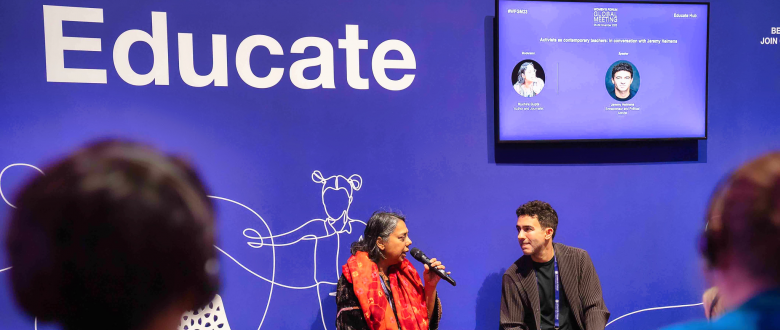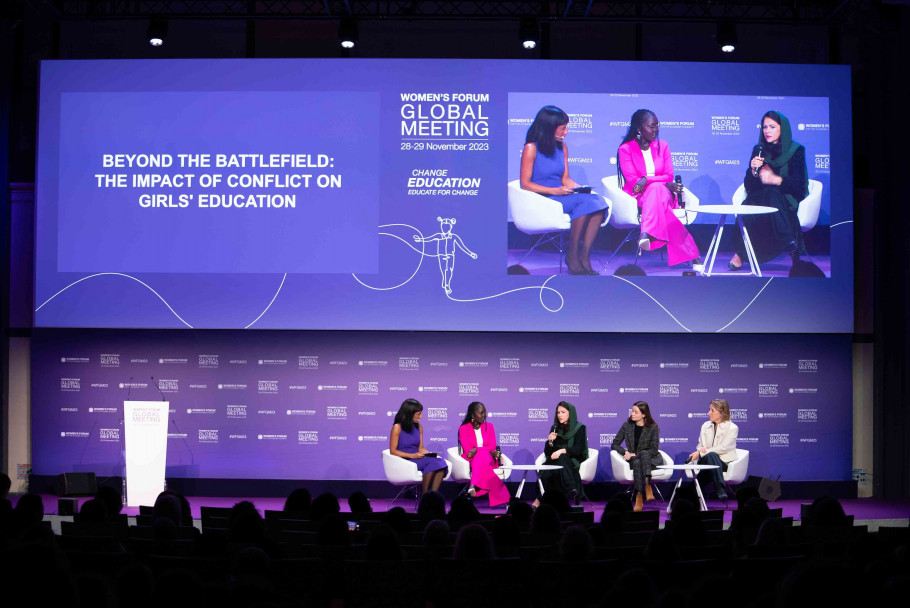
The 18th annual Women's Forum Global Meeting convened in Paris, 28-29 November 2023, during 16 Days of Activism Against Gender-based Violence united leaders and change-makers in an impassioned exploration of gender issues resonating worldwide. Under the theme "Change Education, Educate for Change," the event illuminated the pivotal role of education in crafting a more equitable future.
Unveiling entrenched biases
VVOB had the privilege of attending this transformative dialogue, where illuminating discussions underscored entrenched gender biases obstructing girls' and women's access to education and societal participation. Throughout the forum, hopeful perspectives intertwined with poignant realities. Lauren Rumble, Associate Director of Gender Equality at UNICEF, emphasised education's potential to sculpt a safer, more promising future for all children. However, country-specific educational needs emerged vividly, exemplified by diverse narratives and proposed solutions showcased by the panel speakers.
Discussions ranged from addressing the digital gender gap to confronting complete gender segregation in education, a sobering reality spotlighted by speakers from Afghanistan. Fawzia Koofi, a women's rights activist from Afghanistan, poignantly exposed global inequalities as she asked: "Isn't it heart-wrenching in the 21st century that people talk about AI and going to the moon to discover things that are not discovered but in Afghanistan, girls are not allowed to go to school? Women are not allowed to go to work."
Irrespective of context, the common root cause underlying disparities was unmistakable: pervasive gender biases favouring boys' education over girls'. According to the UNDP’s Gender Norms Index, nearly 9 in 10 individuals worldwide hold biases against women, perpetuating beliefs that men excel as political leaders and justifying violence against women in many societies.
Transforming minds for an equitable future
So, what does gender bias look like in education? In discussions, we learnt of teaching practices that give spelling in masculine forms, that ascribe gender traits such as “tough boys” and “pretty girls”, and that allow boys to take over the playground to play football and exclude girls from sport. Gender bias was described as passed down from generation to generation and from teacher to student.
Dr. Urvashi Sahni, a leading social entrepreneur and educationist, passionately advocated for a reformed education system, highlighting successes she’s seen through her work in India. She called for gender-transformative pedagogies to dismantle ingrained biases, emphasising that classrooms mirror societal prejudices, stating that tackling this bias necessitates a cultural shift rather than a mere revision of textbooks. Sahni's plea for a cultural shift in education underscored the forum's resounding call for transformative change.

All photos © Women's Forum Global Meeting 2023
Empowering narratives and advocacy
In “Beyond the battlefield: The impact of conflict on girls' education”, speakers divulged poignant narratives from conflict-torn regions. In Ukraine, Zoya Lytvyn, educator, and Founder of Osvitoria, an NGO developing education in Ukraine, delineated the struggles of navigating education amidst ongoing conflict, highlighting the perilous challenges faced daily. Yet despite the challenges, she shared the success story of building the first and only national platform for blended and distance learning in Ukraine, created by Osvitoria at the request of the state.
The forum resonated with other empowering narratives, such as Nyakim Gach Gatwech's story, who, despite being denied education growing up in a refugee camp in Ethiopia after fleeing South Sudan, realised her dream of becoming a model when her family found refuge in the US, and she was able to attend school for the very first time at the age of 14. Nyakim now runs NGO BalangNyal Foundation which provides undergarments and personal care products to girls, and she shares her journey to inspire girls in Ethiopia, emphasising the power of finding one's voice beyond societal expectations: “Your voice is the most powerful weapon a woman can have. Find your voice and use it. I was able to find my voice and I went back home and spoke to these girls and let them know that we are more than just a housewife.”
Student Behishta Nazir, who fled Afghanistan and is now studying in Paris, also shared the sentiment that to imagine a different future for women, you need inspiration. Her lightbulb moment was when, while walking through the campus grounds on her way to a university class, she saw a young woman walking a tightrope tied between two trees on the lawn. She thought if that woman in France could do that, why couldn’t she? She thought the same when she saw women running in the rain or in the dark. If they could, why couldn’t she? Behishta began to question the biases, norms and practices she had become accustomed to in her country that excluded women from sports. "I think we should talk about patriarchy and have critical dialogues around patriarchy everywhere — in workplaces, in homes, in schools, and in communities — to name the devil and then destroy it," she said. "One thing that is a lesson for me is to question myself, to be critical, to analyse all the information and insights that I receive and to rethink how I can reinvent my future and maybe my community's future lifestyle and mindset."
A rallying point for change
These discussions echoed a resounding call for transformative education — a holistic approach fostering critical thinking, shattering stereotypes, and nurturing inclusive mindsets. It's not just educational reform but a societal paradigm shift, envisioning a future liberated from gender biases.
The Women's Forum Global Meeting transcended dialogue, compelling action. It urged us to harness our voices, share stories, and embark on an educational transformation where every learner finds inclusion. Such commitment to transformative education would mark a decisive stride towards a more inclusive future.
To learn more about the power of gender-transformative education to change beliefs among teachers, read VVOB’s recently published research from Cambodia.
To invest in our work in gender-transformative education, discover our Gender@Play project which is a project ready to be funded and launched to support 150,000 young children in India, Kenya, and Zambia.




